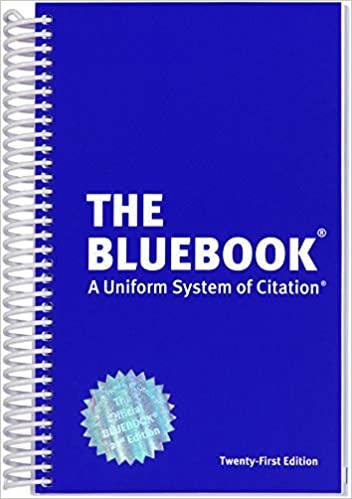Question
ASSIGNMENT INFORMATION Centre for Business School of Management Business Law LAW1011 Professor: Sarah Levy Assignment #1 Instructions This assignment asks you to answer 4 short
ASSIGNMENT INFORMATION
Centre for Business School of Management
Business Law
LAW1011
Professor: Sarah Levy
Assignment #1
Instructions
This assignment asks you to answer 4 short answer questions based upon the case excerpts from Jones v. Tsige 2012 ONCA 32. You will find the case summary you should reference posted with the assignment instructions on BlackBoard.
This assignment is worth 15% of your final mark. Each question is equally weighted. All answers should be typed, in full sentences and 1.5 spaced. You will be graded on the quality of your writing and reasoning.
Each answer should be between 100 - 400words. Focus on what is asked of you in the question. All answers will be evaluated based upon the rubric that has been posted to Blackboard.
Links have been provided in the excerpts to the decision as well as the prior decision by the Ontario Superior Court of Justice. Where you see [...] it indicates that material has been removed.
All assignments are to be submitted via Blackboard.
Your answers must be your own work (see: https://coned.georgebrown.ca/policies/ plagiarism-academic-honesty/) No direct quotes or citations should be used in your answers. If you choose to quote a case, please limit the quote to one sentence, and be sure to cite the case appropriately after by putting the case name in brackets afterwards. Aside from this, everything should be in your words.
Questions
1.The decision of the Ontario Court of Appeal relies upon a variety of sources of law. Identify two sources of law relied upon by the court and identify their weight in decision making. Are they binding or persuasive? (25%)
2.In the Court of Appeal's decision, at para. 4 Sharpe J.A. noted that Tsige "did not publish, distribute or record the information in any way." Should this matter when it comes to liability? Should it matter when it comes to damages? (25%)
3.Explain how this case helps us understand how the common law evolves. In supporting your argument identify one case that we have discussed in class that illustrates how the common law evolves. See Sharpe J.A.'s comments at paragraphs 66 and 67 (25%)
4.What does this case tell us about concerns that businesses need to consider when addressing how they handle sensitive information? (25%)
Step by Step Solution
There are 3 Steps involved in it
Step: 1

Get Instant Access to Expert-Tailored Solutions
See step-by-step solutions with expert insights and AI powered tools for academic success
Step: 2

Step: 3

Ace Your Homework with AI
Get the answers you need in no time with our AI-driven, step-by-step assistance
Get Started


